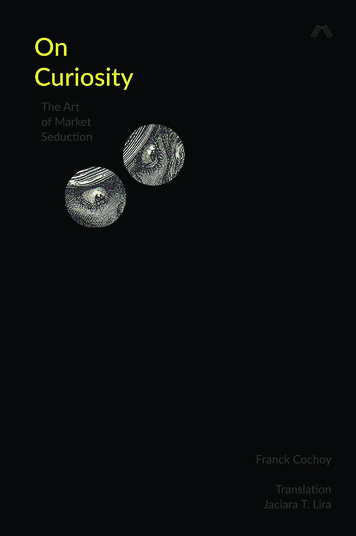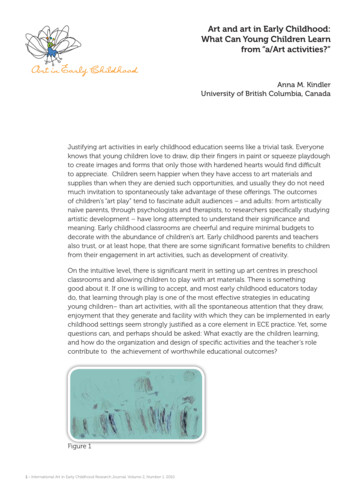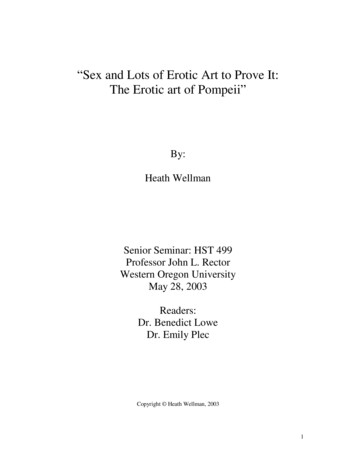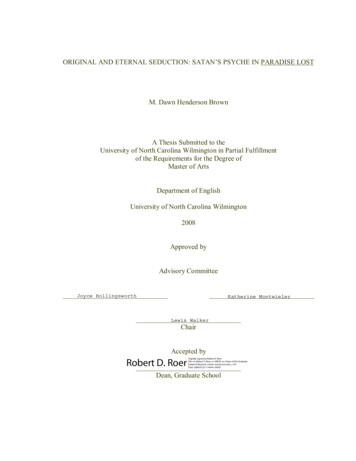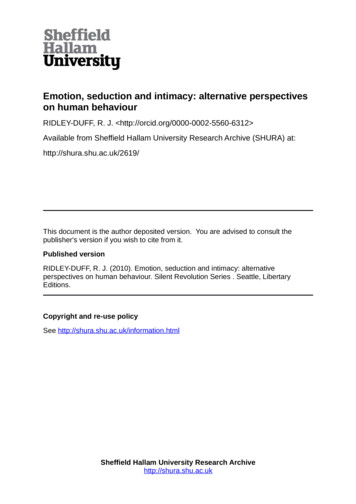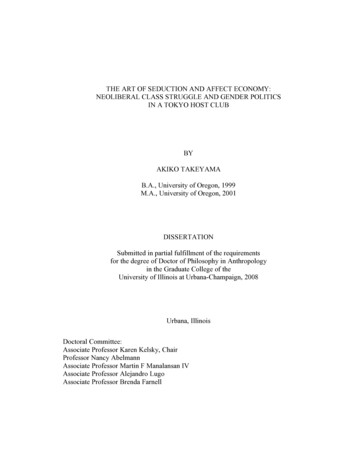
Transcription
THE ART OF SEDUCTION AND AFFECT ECONOMY:NEOLIBERAL CLASS STRUGGLE AND GENDER POLITICSIN A TOKYO HOST CLUBBYAKIKO TAKEYAMAB.A., University of Oregon, 1999M.A., University of Oregon, 2001DISSERTATIONSubmitted in partial fulfillment of the requirementsfor the degree of Doctor of Philosophy in Anthropologyin the Graduate College of theUniversity of Illinois at Urbana-Champaign, 2008Urbana, IllinoisDoctoral Committee:Associate Professor Karen Kelsky, ChairProfessor Nancy AbelmannAssociate Professor Martin F Manalansan IVAssociate Professor Alejandro LugoAssociate Professor Brenda Farnell
ABSTRACTMy dissertation investigates the underground world of Japan’s increasinglypopular host club scene, where mostly young, working-class men “sell” romance, love,and sometimes sex to indulge their female clients’ fantasy, often for exorbitant sums ofmoney. I explore this commercialization of feelings, emotions, and romantic relationships— what I call ‘affect economy’— in the context of Japan’s recent socioeconomicrestructuring, a reaction to globalization that is reshaping the nation’s labor andcommodity forms. Based on ethnographic fieldwork I conducted in Tokyo between 2003and 2005, I argue that selfhood, lifestyles, and social relationships have becomecommodifiable at the intersection of Japan’s postindustrial consumer culture andneoliberal globalization. My dissertation aims to provide a fine-grained ethnographicportrait of how hosts and their clients mutually seduce one another to foster acommodified form of romance whereby both sides seek alternative lives and cultivatetheir desirable selves —potentially successful entrepreneurial men and sexually attractivewomen—while it simultaneously underscores gender subordination, social inequality,and the exploitative nature of the affect economy in Japan. I illuminate how mutualseduction between hosts and their clients intertwines with Japan’s neoliberalpolicymaking and governance that similarly capitalizes on and mobilizes individualhopes, dreams, and self-motivations to satisfy both their own and national interests. Inturn, I theorize seduction as a form of power that entails suggestive speech and bodilyacts to entice the other person(s) into acting for both the seducer’s and the seducee(s)’ends. Seduction is, I argue, neither a mere sexual temptation nor a sinful deception, but aubiquitous yet unstructured tactic that institutions and individuals alike employ toii
manipulate the other and shape power dynamics. The art of seduction is, thus, a form ofsocial governance-at-a-distance and also a pivot of speculative accumulation of capital.iii
For My Familyiv
ACKNOWLEDGEMENTSThis dissertation project would not have been possible without the support ofmany people, academic programs, and grant agents. My special thanks go to my adviser,Karen Kelsky, who strongly believes in students’ creativity and has allowed me to pursuemy academic interests. Her tireless encouragement, practical advice, critical thinking, andprofessionalization tips are indispensable, and without her guidance over the last tenyears, I couldn’t have come very far. I also thank my committee members, NancyAbelmann, Martin Manalansan, Alejandro Lugo, and Brenda Farnell. Nancy kindlyinvited me to her “Nancy’s advisee meetings” and established a friendly environmentwhere personal and intellectual bonding was nurtured. Her keen ethnographic eyes alsohelped me substantiate my vague ideas. Martin guided my project to the study of affect inrelation to gender, sexuality, and the global economy, and also kept challenging me tothink more critically. Both Nancy and Martin’s responsive consideration were invaluableto the success of my project. Alejandro and Brenda helped expand my scope further togender matters in masculinity studies and body movements as meaning makingprocesses.I also want to extend my appreciation to the host club owners, who allowed me toconduct my fieldwork, as well as the hosts and female clients who willingly talked to meand/or invited me to observe their activities outside the clubs. In Japan, Prof. UenoChizuko generously agreed to serve as a supervisor and accepted me as a special researchfellow at the School of Humanities and Sociologies, University of Tokyo, between 2004and 2005. I was very lucky to attend her seminars, including the two-night, three-dayv
“Ueno seminar trip.” Her witty comments and questions, which unceasingly ask, “Sowhat?,” pushed me to better equip myself with empirical data and a sound theoreticalframework.Many programs at the University of Illinois, Urbana-Champaign (UIUC) havebeen generous in their support of my doctoral research and writing. I received a GeorgeL. Beslow Graduate Fellowship for dissertation writing, a Graduate Student SummerResearch Assistance Award, and numerous conference travel grants and teachingfellowships through the Department of Anthropology. The UIUC’s Graduate School,Center for East Asian and Pacific Studies, Unit of Criticism and Interpretive Theory, andDepartment of East Asian Languages and Cultures also provided financial support thatenabled me to teach, present my research papers at academic conferences, and completemy dissertation in a timely manner.For research support, I am grateful to many organizations. My preliminaryresearch in 2002 was supported by the Freeman Student Fellowship for PersonalizedLearning in Asia. A National Science Foundation Ethnographic Research Graining Granthelped me acquire first-hand research training. The Japan Foundation DoctoralFellowship enabled my twelve-month ethnographic study in Tokyo, Japan, between 2004and 2005. A Bestor Prize for Best Graduate Paper in the Society for East AsianAnthropology of the American Anthropological Association contributed funds andencouragement to my thesis project. A Dissertation Workshop Fellowship on Market andModernities in Asia in the Asian Institute at the University of Toronto also provided mewith an opportunity to interact with other dissertation writers and develop intellectualnetworking.vi
Finally, thanks to Nancy’s advisees, numerous friends, and my family, whoendured this long process with me always offering support, humor, and love. They taughtme the importance of belief, courage, and hope. In particular, my best friend, rival, andbrother, Masato, has demonstrated that miracles can happen when you don’t give up andwork hard. My parents, as well as grandmother, none of whom have a post-secondaryeducational background, have taught me wisdom in life and continue to believe in andsupport me. Last but not least, my partner and husband, Will, has been always there forme to assist in numerous ways. He constantly provided his proofreading, editing, andjournalistic insights into my project. His laid-back attitude, forgiving personality, andsense of humor made my graduate life so much easier and helped me maintain myphysical and mental health.vii
TABLE OF CONTENTSCHAPTER 1: INTRODUCTION .1Literature Review .9Of Japan’s Host Club . 29Sites, Methodology, and Self-Reflection . 36Organization of Dissertation . 42CHAPTER 2: THE TRIUMPH OF ROMANCE: AFFECTIVE SELF AND THE ARTOF SEDUCTION . 46“Genuine” Self: Cute Culture in the 1970s. 55Fragmented Self: Sign Economy in the 1980s . 62“Natural” Selfness: Neoliberal Economy in the 1990s. 69Affective Self in the New Millennium. 79Chapter Conclusion. 90CHAPTER 3: COMMODIFIED ROMANCE IN A TOKYO HOST CLUB . 93Kabuki-chō in the Sign of Differences . 98Walking Alone in the Red Light District . 103Affective Labor and Intimacy in Club Fantasy. 107Intensified Intimacy in the After Hour Activity. 118Various “Falling For” Hosts. 124Chapter Conclusion. 129CHAPTER 4: NEOLIBERAL CLASS STRUGGLE: SELF-NARRATEDENTREPRENEUR HOSTS VIA COMMODIFYING THE SELF. 133The Opportunity Myth . 137Topography of Self-Motivation. 144Self-Narrated Entrepreneurs. 150Speculative Accumulation of Capital . 158The Art of Seduction. 166Chapter Conclusion. 176CHAPTER 5: THE GENDER POLITICS OF PASSIVITY: TRANSGRESSINGNORMS AND SELF-FASHIONING ‘DESIRABLE’ WOMEN . 180viii
Romance as an All-Purpose Means . 186Pursuit of the “Super Woman” . 195The Gendered Logic of Romantic Love . 203Chapter Conclusion. 211CHAPTER 6: CONCLUSION. 214REFERENCES. 221AUTHOR’S BIOGRAPHY. 242ix
CHAPTER 1: INTRODUCTIONThis is an ethnographic study about affect —feelings, emotions, desires, andintimacy— and its commodification in Japan. Affect, which is rooted in the body andscripted through social interaction, is a vehicle for self-expression and interpersonalcommunication. It has increasingly become commercialized as a means of evokingexcitement, pleasure, and a sense of ‘freedom’ in postindustrial consumer culture, andhas accelerated in the wake of Japan’s recent neoliberal restructuring and marketderegulation. As part of my study, I investigate Japan’s increasingly popular host clubscene, where working class men “sell” romance, love, and sex to their female clients, foroften exorbitant sums of money. In the club, hosts and their clients mutually seduce oneanother—fostering a commodified form of romance—whereby both sides seekalternative lives and perform and cultivate their desirable selves. I argue that thecommodification of romance manifests and magnifies what I call an ‘affect economy’ inJapan’s socio-historical conjuncture of postindustrial consumer culture and neoliberalglobalization.Affect economy is the term I use to refer to the so-called service industry and byextension postindustrial socioeconomy that capitalizes on affect in order to enticeindividuals into acting for both their own and various institutional or collective ends. It isnot, however, merely capitalist manipulation of the mass or state governance ofindividual affect. Rather, it is a form of cultural politics within which individuals, as wellas social institutions, strategize their speech and bodily acts and stir another’s emotions,desires, and psychology for advantageous trade in sexual, romantic, business, political,1
and other social settings. Thus, I define an affect economy both narrowly and broadly: anaffect economy is a form of highly personalized market transaction and also a marketexchange in general that takes advantage of affect for persuasion and a better deal. Assuch, the affect economy in a broad sense crisscrosses the body, the social, and thepolitical economy is a dynamic means, script, and process that social actors play out fromtheir own positionality.The affect economy mirrors global economic trends. In their influential bookMultitudes (2004), Michael Hardt and Antonio Negri claim that the global economy has,over the last two decades, shifted from industrial, or material, labor to immaterial labor—labor that “creates immaterial products, such as knowledge, information, communication,a relationship, or an emotional response” (108). Admitting that material labor stillcomprises a quantitative majority of the world’s labor forces, however, they contend thatqualitatively the world economy is moving toward immaterial labor—commonly knownas the information age and new economy. For them, “affective labor” is a principle formwhich “produces or manipulates affects such as a feeling of ease, well-being, satisfaction,excitement, or passion” and shapes social life itself (108). Such affective labor isobserved in today’s formal and informal service industry, including but not limited to:tourism, sexual amusement, counseling, self-help seminars, aesthetic and relaxationsalons, nannies, maid, and so on (Cruikshank 1993; Ehrenreich and Hochschild 2004;Eng 2006; Joseph 2002).Indeed, neither the affect economy nor affective labor —the production of affectfor market exchange— is entirely new. The so-called culture industry, which includesimage, information, and knowledge, for example, has long utilized affective labor to2
appeal to consumer’s aesthetics and sensuality, and has become very influential,particularly in late-capitalist societies (Baudrillard 1994; Haug 1986; Horkheimer andAdorno 1972). It is now largely established, and widely circulated, via the expansion ofglobal consumerism (Mazzarella 2003). While such industries based on mass productionand consumption still distinguish between the affect producer and recipient, personalizedservice industries such as the host club, where both service providers and recipientsmutually attempt to appeal to one another’s aesthetics and sensuality to foster an intimaterelationship, blur conventional binaries such as service providers and recipients,production and consumption, and the consuming and consumed subjects. The end resultis that producer and consumer alike are drawn into the affect economy in the name ofpersonal choice and responsibility and in the neoliberal market logic of selfentrepreneurship and self-fulfillment. The affect economy is thus closely linked withrecent neoliberal globalization.In the host club, both hosts and their clients “work” on their appearance, skills ofseduction and persuasion, and flair for the dramatic so as to optimize their monetary andaffective exchanges, i.e., their hard-earned self-fulfillment. Here, ‘work’ becomes ameans and process of self-making, and is evaluated by its marketability and desirability.The self is given credit for his/her work metonymically. In other words, money andaffect—romantic love, attentiveness, caring—become tokens for both successful workand the entrepreneurial self, the self that is simultaneously the object and subject of thework. Thus, inherited and/or acquired skills, knowledge, and sensibility consist of his/herdesirability and market value, i.e., human capital that engenders only through marketexchange in Japan’s affect economy. By the same token, human capital becomes3
inseparable from the individual (Gordon 1991). The affect economy in Japan that is builtupon postindustrial consumer culture and fueled by neoliberal market logic encompassesboth production and consumption as two sides of the same coin: a means of fashioningthe desirable self and enhancing one’s human capital.This highly personalized business activity is, I argue, gaining rapidly amidJapan’s socioeconomic restructuring. Over the past decade, the Japanese government hasmoved to privatize the nation’s public-state sectors by injecting neoliberal marketimperatives —individual creativity, knowledge production, entrepreneurship, competitionfor self-actualization, and personal freedom and responsibility. While heavily promotingrestructuring (kōzōkaikaku), deregulation (kiseikanwa), and privatization (min’eika), theformer Koizumi administration proposed to create over two to three million new jobswithin five years by expanding service-based industries such as housekeeping,child/elderly care, beauty and health care, entertainment and amusement, and so on(Shimada 2004). This kind of commodification of hitherto public assets and the‘intimate’ private sphere, Harvey asserts, is a feature of the neoliberal project and it isspreading globally (Harvey 2005: 160).As I argue throughout my project, the host club is not just another example ofJapan’s ephemeral, fad-driven subculture, but a constitutive element of Japan’s affecteconomy—an economy rooted in postindustrial consumerism and neoliberalglobalization. The first host club establishment, in fact, opened in the mid-1960s, inTokyo, where it remained relatively unknown to the public until the business suddenlybegan to draw media attention in the mid-1990s. This occurred for a number of reasonswhich I explain further in this chapter, but it is revealing that scholarly recognition of the4
affect economy in Japan has closely paralleled the rapid business success of the host club,especially since Japan’s neoliberal socioeconomic restructuring was first put into force inthe 1990s. Studying how Japan’s affect economy has evolved, I argue that Japan’spostindustrial consumer culture, which has expanded enormously since the 1970s andincreasingly places value on individual choice, self-fashioning, and personal ‘freedom’against social constraints, has contingently paved the road for neoliberal restructuring andthe rationale for individual creativity, self-actualization, result-oriented competition, andpersonal freedom and responsibility.Scholarship on the genealogy of neoliberalism often treats neoliberalism as acontinuum of 18th century Liberalism and traces the historical trajectory of Westernpolitico-economic cultural hegemony (e.g., Brown 2003; Duggan 2003). In this dominantmodel, neoliberalism emerges as an economic doctrine in postwar West Germany and the1960s U.S. Chicago School (Brown 2003; Lemke 2001; Ong 2006). Aligned with thepopular understanding of neoiberalism is the association with U.S.-centered politicoeconomic principles couched in the rhetoric of so-called ‘small government’ and ‘freemarkets’ (Brown 2003; Ong 2006). Neoliberalism is often equated with economicglobalization, largely disseminated through supranational organizations such as the WordBank, the International Monetary Fund (IMF), and the World Trade Organization(WTO). Some scholars have problematized this blanket historicization and focused on thesocio-historical specificity that shapes different market forms and their relation to thestate (Clark 2004; Lemke 2001). Nonetheless, the study of neoliberal genealogy is stilllargely limited to Western contexts (Burchell 1996; Dean 1999; Ong 2006). Scholars whostudy non-Western contexts struggle with how to conceptualize historical transformation5
in relation to neoliberal reformation on a global scale (Hoffmann et. al. 2006). Myapproach to neoliberalism by way of affect economics is particularly useful in nonWestern socio-historical milieu such as Japan’s, where liberalism has been selectivelyimported and articulated, but has not taken root in such a systematic way as in the West.As I argue, Japan’s case foils the dominant Euro-American model of neoliberalism andhighlights potentially multiple forms and origins.Neoliberalism is not merely a politico-economic principle; it has underlyingimplications and logics, as well as its social effect. Marxist scholars, for instance, havecriticized neoliberalism as a class ideology for upward distribution of social resourcesand a covert depoliticizing of structural inequalities on national and global scales (Brown2003; Harvey 2005; Comaroff and Comaroff 2000). Foucauldian scholars have arguedthat neoliberalism is a political rationality that creates docile subjects who believe in“freedom” and thereby willingly govern themselves to become rational and responsible(Burchell 1996; Gordon 1991; Lemke 2001). These scholars have revealed thatneoliberalism is not an ontological reality, but a constitutivist project that attempts tocreate new norms and rationalities (Brown 2003; Butchell 1996: 22; Dean 1999; Lemke2002: 55). Nonetheless, they have largely missed how individual social actors, as well aspolitico-economic institutions, actually engage in the process of making of and/orstruggling with new norms and rationalities.In my project, I analyze how individual actors, who take advantage of an affecteconomy, imagine the implications of Japan’s neoliberal reformation, strategize theirperformances, and act out neoliberal values and ethics from their own positionality. Malehosts, who typically have minimal education and poor job prospects, for instance,6
devalue Japan’s conventionally hegemonic salaryman model and idealize the hostingbusiness for its flexible work style, result-oriented wage system, and opportunity forunhindered success. On the other hand, female clients fantasize romantic excitement as ameans to realize a fashionable lifestyle, entrepreneurial self, and personal ‘freedom.’Thus, both men’s and women’s narratives and practices are closely aligned with theneoliberal restructuring that has questioned Japan’s existing social model and structure.This has occurred at the same time that the government has promoted highly personalizedservice industries and emphasized entrepreneurship, competition, and personal ‘freedom’as new ethics. Indeed, both individuals and politico-economic institutions similarlyengage in and act out the process of neoliberal reformation. Neoliberalism is then a socialethos and practice that shapes (and is shaped by) discursive speech and bodily actscritical of the status quo and seeks alternatives for ‘freedom,’ that is, freedom fromconventional norms and ethics, but not necessarily to transcendence.This practice is closely related to subjectivity formation because it is embedded inand derived from the frustrations, struggles, desires, and fantasies of the practitioners,who are socially situated in gendered, sexualized, and class-marked terms. The end gameof their neoliberal practice —critique of the status quo for ‘freedom’— lies in selffashioning as desirable selves. As I will detail in later chapters, hosts, for example,denigrate salarymen and sex workers and differentiate themselves so as to identifythemselves as self-motivated entrepreneurs, whereas female clients undermine theirfaceless mother figure symbolism and selflessly devoting wife stereotype so that they canself-narrate as individual and self-fulfilled women. As such, neoliberalism is not justabout self-positioning in relation to existing social norms, practices, and identity7
categories, but also about self-fashioning, carrying a feeling of desirability, achieving asense of fulfillment, and a passion for ‘freedom.’ Action and affect is thus at the core ofneoliberal practice, and neoliberal subjectivity formation is simultaneously the visceraland rational, the self and the other, and the personal and social that engenders through thepractitioner’s speech and bodily acts and affective experiences.The duality of neoliberal practice—self-positioning and self-fashioning—is notlimited to individual social actors. The Japanese government is no exception. TheKoizumi administration fiercely problematized Japan’s conformist structure inbureaucracy, employment, and education and put ‘restructuring without mercy’ (seiikinaki kaikaku) into force in order to improve Japan’s global competitiveness. Here, thegovernmental neoliberal practice also aims at constructing alternative ethics, practices,and systems so as to create a desirable national identity in the global economy. Thus,discursive neoliberal practices that crisscross individual aspirations, national agendas,and global trends are not different kinds of practices; they rather have different degrees ofeffect due to their unequal social, political, and geographic postitionality. In this respect,Japan’s host club scene is a relevant lens to analyze and observe how the affect economyis taking shape in the era of neoliberal globalization.Japan’s host club scene provides a unique and complex picture of the neoliberalpractices that gendered, sexualized, and class-marked individuals participate in andinteract—ones that the nation-state and global economy similarly engage in.Functionally, it opens a window to observe and analyze: 1) How affect economy such ashost club business is built upon postindustrial consumer culture and fueled by neoliberalreformation in Japan; 2) the social situation in which neoliberal practices have become8
thinkable and practicable; and 3) how individual actors engage in neoliberal practices andwhy they perform and cultivate ambivalent identities.My ultimate goal lies in rethinking conventional academic practices that havelargely overlooked affect as something bodily, subjective, and unobservable. Inparticular, academic criticism, which is an often language-centered and/or visual-orientedstudy of observable objects of social phenomena, I argue, has reinforced the Westernmodernist tradition of hierarchical binary systems. That is, bifurcating the mind/body, therationality/irrationality, the objective/subjective, and the visual/other sensory organs, andvaluing the former as soley reliable and legitimate sites for observation and scholarlywriting. Even scholars who critically analyze modernity as a social mechanism tend toemploy the conventional approaches to problematize and/or deconstruct it. Nonetheless,they also unintentionally reproduce the Western modernist practice of seeing, thinking,and writing. Thus, my study that aims to illustrate how individuals and institutionsmaneuver their ends through affect is not only about the affect economy per se, but itaddresses the issue of modernity and academic criticism itself.Literature ReviewTo further discuss the concepts and practices of the affect economy, I will reviewthree bodies of literature on neoliberalism (genealogy of neoliberalism and neoliberalgovernmentality), the affect economy, and gender politics in Japan. By doing so, I willdiscuss three interrelated issues. The first, neoliberal situation, examines the question ofwhat makes neoliberalism thinkable and practicable and suggests a conceptual and9
theoretical issue at stake: neoliberalism cannot be discussed in lieu of socio-historicallyspecific local contexts, i.e., existing social norms, actors, and their desires.The second issue is that of the methodology of studying neoliberalgovernmentality and affect economy. I argue that existing scholarship on neoliberalismtends to focus on how it is discursively operated as a whole based on language-centeredanalysis of economic doctrine, political campaigns, and cultural policy. Similarly, thestudy of affect economy has a tendency to use binary frames such as economics andemotions, exploitation and democracy, and instrumentality and affectivity. Instead oftotalizing and bifurcating such framing, I propose the art of seduction —the deploymentof suggestive bodily and speech acts to entice the other into acting for the seducer’s end,as well as the seducee’s— as a useful tool to analyze how neoliberal governance and theaffect economy is put into action and what kinds of social effects the action causes.The third topic concerns neoliberal subjects who tend to regard themselves asself-autonomous but in truth are governed through regulated choices, guided conducts,and social norms, i.e., neoliberal governance. I intend to further the discussion—theneoliberal subject as the subjugated— by asking not whether they are docile so much ascleverly performing subjection as a guise for subversive enactments that collectively pryopen the gates to social transformation.Genealogy of NeoliberalismIn an article titled “Notes on the Anthropology of Neoliberalism,” Lisa Hoffmanet al. contend that while “ever more anthropological studies are concerned withneoliberalism, there have been few steps made toward an anthropology of neoliberalism”10
in terms of a conceptual and methodological contribution as a discipline (2006: 9). Intheir critique, they raise three interrelated questions: 1) How can anthropologists writeagainst the dominant conservative libertarian tradition that maintains liberalismneoliberalism patrimony? 2) How can we grapple with similar, yet not quite the samefeatures of historical transformations and socioeconomic reforms often associated withneoliberalism? 3) What conceptual and methodological tools are appropriate and usefulfor an anthropology of neoliberalism? (Hoffman et al 2006: 10)In this section, I will elaborate on the notion of what I call “neoliberal situation”by borrowing Appadurai’s concept of the “commodity situation.” In his edited volume,Social Lives of Things (1986), Appadurai proposes to analyze socio-historical situationsin which any ‘things’ become exchangeable for some other things and how theexchangeability becomes socially
THE ART OF SEDUCTION AND AFFECT ECONOMY: NEOLIBERAL CLASS STRUGGLE AND GENDER POLITICS IN A TOKYO HOST CLUB BY AKIKO TAKEYAMA B.A., University of Oregon, 1999 M.A., University of Oregon, 2001 DISSERTATION Submitted in partial fulfillment of the requirements for the degree



